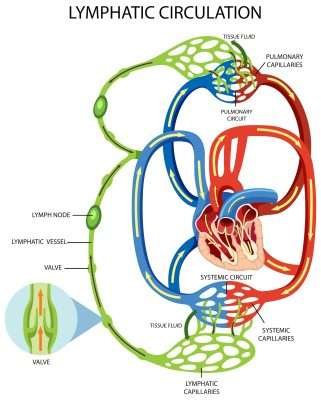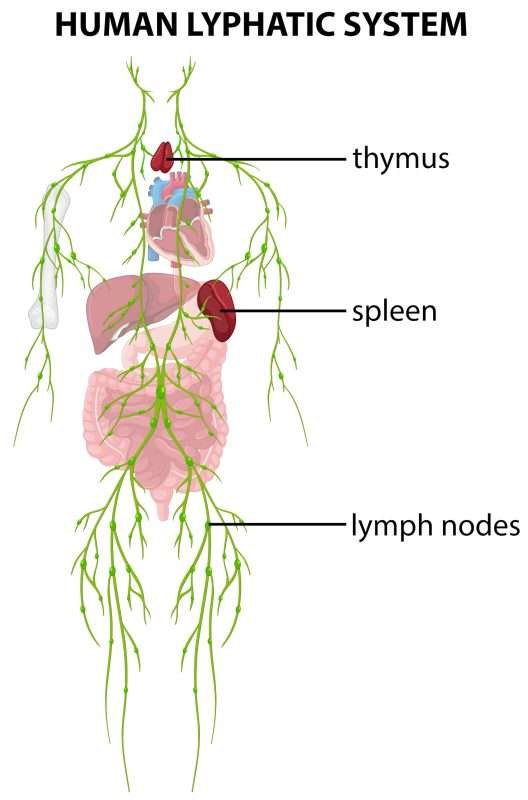How To Stimulate Your Lymphatic System
The lymphatic system is a crucial component of the human body’s immune system, responsible for maintaining fluid balance, filtering out toxins and waste products, and supporting overall health. However, unlike the circulatory system, which has the heart to pump blood, the lymphatic system relies on physical movement, muscle contraction, and external factors to keep it functioning optimally. In this comprehensive guide, we will explore various ways how to stimulate your lymphatic system, promoting better health and well-being.
Understanding the Lymphatic System
Before delving into methods to stimulate the lymphatic system, it’s essential to grasp its role and anatomy. The lymphatic system is a complex network of vessels, nodes, and organs that transports lymph, a colorless fluid containing white blood cells, through the body. Lymph plays a vital role in:
- Immune Function: Lymph carries immune cells like lymphocytes and macrophages, which help the body defend against infections and diseases.
- Waste Removal: The lymphatic system helps remove waste products, toxins, and excess fluids from tissues, preventing swelling and edema.
- Fluid Balance: Maintaining the balance of fluids in the body’s cells and tissues is essential for overall health.
- Fat Absorption: In the small intestine, the lymphatic system assists in the absorption of dietary fats.

Given its importance, it’s crucial to ensure the lymphatic system functions efficiently. Below are various methods how to stimulate your lymphatic system:
-
Exercise Regularly
Physical activity is one of the most effective ways to stimulate the lymphatic system. When you move your muscles, they contract and relax, promoting the flow of lymph through the lymphatic vessels. Here’s how you can use exercise to enhance lymphatic circulation:
- Cardiovascular Exercise: Activities like jogging, cycling, swimming, and brisk walking increase heart rate and muscle contraction, facilitating lymphatic flow.
- Strength Training: Resistance exercises, such as weightlifting, enhance muscle contraction, helping lymphatic vessels pump lymph.
- Yoga and Stretching: Gentle yoga and stretching exercises promote lymphatic drainage and can be especially helpful in reducing swelling and discomfort.
-
Stay Hydrated
Proper hydration is essential for the lymphatic system to function optimally. When you’re well-hydrated, lymph becomes less viscous, making it easier to flow through the vessels. Aim to drink at least 8 glasses of water a day and consume water-rich foods like fruits and vegetables to maintain adequate hydration levels.
-
Maintain a Healthy Diet
A balanced diet plays a significant role in supporting your lymphatic system. Focus on consuming nutrient-rich foods that provide essential vitamins and minerals, such as vitamin C, vitamin E, and zinc, which are beneficial for immune function. Additionally, incorporating foods like garlic, ginger, and turmeric, known for their anti-inflammatory properties, can help reduce lymphatic congestion.
-
Manage Stress
Chronic stress can have a negative impact on the lymphatic system by increasing inflammation and impeding lymphatic flow. Practice stress-reduction techniques like meditation, deep breathing exercises, mindfulness, or yoga to help your body relax and improve lymphatic function.
-
Skin Brushing
Dry skin brushing is a traditional technique that involves using a soft-bristled brush to gently stroke the skin in the direction of lymphatic flow. This practice helps remove dead skin cells, stimulates lymphatic vessels, and encourages lymphatic drainage. Before showering, use a natural bristle brush to brush your skin, starting from your feet and moving upwards towards your heart.
-
Massage Therapy
Lymphatic drainage massage, performed by a trained therapist, is a specialized technique designed to stimulate lymphatic circulation. The therapist uses gentle, rhythmic movements to encourage lymphatic flow, helping reduce swelling and promoting detoxification. This type of massage is often recommended for individuals with lymphedema or post-surgery recovery.
-
Compression Garments
Compression garments, such as lymphedema sleeves or stockings, provide external pressure on the limbs, aiding in lymphatic drainage. These garments are commonly prescribed for individuals with lymphatic issues or post-surgical recovery.
-
Contrast Hydrotherapy
Contrast hydrotherapy involves alternating between hot and cold water in the shower. This stimulates blood circulation and may indirectly support the lymphatic system by improving overall circulation. Always finish with a cold shower to encourage blood vessel constriction.
-
Herbal Remedies
Certain herbs and supplements are believed to support lymphatic function. Consult with a healthcare professional before using any herbs or supplements, as they can interact with medications or have side effects. Some herbs thought to benefit the lymphatic system include:
- Echinacea: Known for its immune-boosting properties.
- Red clover: Thought to help cleanse the lymphatic system.
- Cleavers: Believed to be a mild lymphatic tonic.
-
Maintain a Healthy Weight
Excess body weight can impede lymphatic flow, leading to stagnation and swelling. Maintaining a healthy weight through a balanced diet and regular exercise can support optimal lymphatic function.
-
Avoid Tight Clothing
Wearing tight clothing, especially around the waist, groin, and underarms, can restrict lymphatic flow. Opt for loose-fitting, breathable attire to allow for better circulation.
-
Stay Active Throughout the Day
If you have a sedentary job or lifestyle, make an effort to move regularly. Simple activities like stretching, standing up, and walking around for a few minutes every hour can prevent lymphatic stagnation.
-
Deep Breathing Exercises
Deep diaphragmatic breathing encourages the movement of the diaphragm, which, in turn, massages the abdominal lymphatic vessels. Incorporate deep breathing exercises into your daily routine to promote lymphatic flow.
-
Avoid Toxins
Limit your exposure to environmental toxins, such as cigarette smoke, pollution, and chemicals in personal care products. These toxins can overwhelm the lymphatic system and impair its function.
-
Alkaline Diet
Some proponents of alternative medicine believe that an alkaline diet, which emphasizes alkaline-forming foods like fruits and vegetables, can support lymphatic health by reducing acidity in the body. However, scientific evidence for this claim is limited.
How to stimulate your lymphatic system.
The lymphatic system is a critical part of the body’s immune and waste removal systems, and its proper functioning is essential for overall health and well-being. How to stimulate your lymphatic system through various methods, such as regular exercise, a healthy diet, hydration, and stress management, can help ensure it operates efficiently. Additionally, practices like dry skin brushing, massage therapy, and herbal remedies may provide additional support for those seeking to optimize their lymphatic health.
Remember that it’s important to consult with a healthcare professional before making significant changes to your lifestyle or starting any new supplements or treatments, especially if you have a preexisting medical condition. By incorporating these strategies into your daily routine and maintaining a proactive approach to lymphatic health, you can promote a healthier, more resilient immune system and overall well-being.
The Importance of Post-Operative Lymphatic Drainage Massage for Plastic Surgery Recovery
Fio de Ouro 3 in 1 Cleansing Cream 250ml
Fio de Ouro Hydration Booster Facial Mask 250ml

